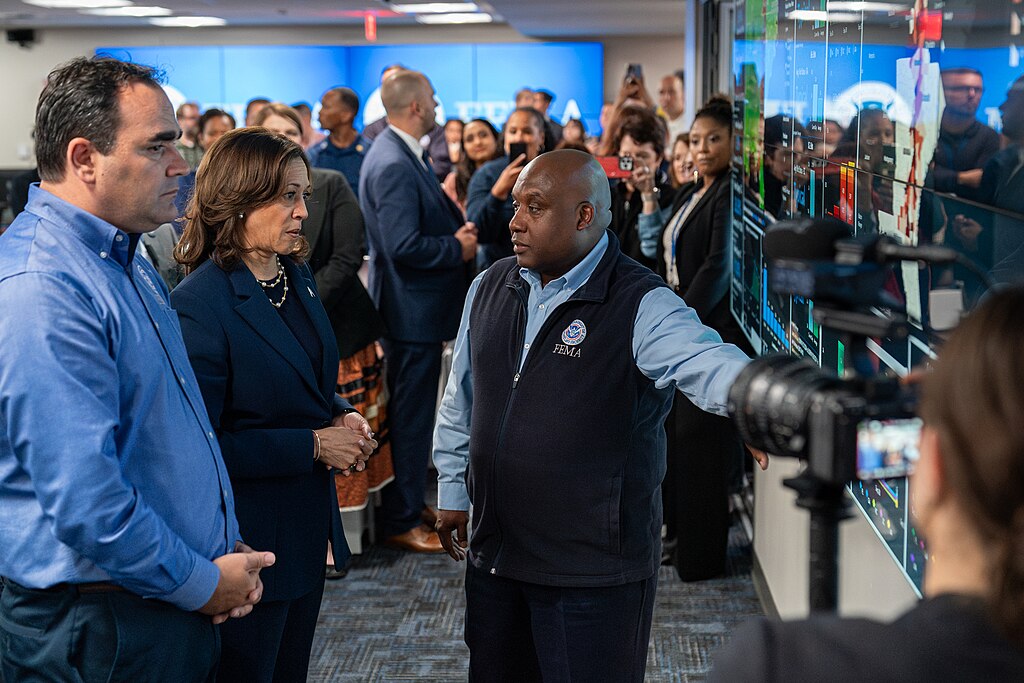A heated controversy erupted today after claims surfaced suggesting that Google search results are biased against former President Donald Trump. Some users argue that Google has been favoring Democratic candidates, particularly Vice President Kamala Harris, by allegedly directing voters to information on where to cast ballots for her, while making it harder to find similar information for Trump. The accusation of potential election interference has sparked online backlash and reignited debates over Big Tech’s role in politics.
The claims originated from a social media post asserting that a Google search for “where to vote for Donald J. Trump” yields less straightforward results compared to a similar query for “where to vote for Kamala Harris.” Supporters of Trump quickly seized upon the claim, alleging that it reflects a systemic bias by Google, which they argue could affect voter turnout. “ELECTION INTERFERENCE!” wrote one user, summarizing a sentiment that has since spread across social media. Many supporters allege that the disparity could influence voters, particularly those who are less familiar with their local polling sites or voting options.
Critics and political commentators have been quick to weigh in on the matter. Some view it as another example of perceived bias among Big Tech platforms, pointing to past controversies where social media companies faced similar accusations. “This isn’t the first time we’ve seen allegations like this,” said Dr. Amanda Porter, a technology and politics expert. “The concern is that these platforms have the power to subtly influence voter behavior through seemingly innocuous search results.”
For their part, Google has denied any bias in their search algorithms, maintaining that their systems are designed to provide accurate, neutral information. In a public statement, Google clarified that all election-related searches are treated equally and that results are algorithmically generated based on relevance and user location. “Google does not favor any political candidate or ideology in our search results,” the statement read. “We are committed to providing fair access to information, especially during elections, to ensure that every voter is informed.”
Despite Google’s response, the controversy has only deepened, with some prominent Republicans calling for further investigation into Big Tech’s influence on elections. “If Google is steering voters one way, that’s interference,” argued RNC spokesperson Haley Carlson. “These tech giants need to be transparent about their practices and ensure that they’re not subtly tilting the scales.”
Political analysts are closely monitoring the situation, particularly as Google’s influence on public opinion remains a critical area of study in the digital age. “When information access is controlled by a few large companies, even perceived bias can have a significant impact,” said Dr. Leonard Brooks, a professor of media studies. “Whether intentional or not, these perceptions contribute to mistrust in electoral processes.”
As Election Day approaches, the incident has amplified calls for greater transparency and accountability from tech platforms regarding their algorithms and data practices. Supporters of both candidates urge voters to verify information through multiple sources to avoid misinformation or perceived bias. Whether Google’s search results were a coincidence or an unintended algorithmic error remains to be seen, but the controversy has further underscored the influential role of tech companies in modern politics.



 Ohio Man Indicted for Alleged Threat Against Vice President JD Vance, Faces Additional Federal Charges
Ohio Man Indicted for Alleged Threat Against Vice President JD Vance, Faces Additional Federal Charges  U.S. Lawmakers to Review Unredacted Jeffrey Epstein DOJ Files Starting Monday
U.S. Lawmakers to Review Unredacted Jeffrey Epstein DOJ Files Starting Monday  Trump Allows Commercial Fishing in Protected New England Waters
Trump Allows Commercial Fishing in Protected New England Waters  Trump Says “Very Good Talks” Underway on Russia-Ukraine War as Peace Efforts Continue
Trump Says “Very Good Talks” Underway on Russia-Ukraine War as Peace Efforts Continue  Jack Lang Resigns as Head of Arab World Institute Amid Epstein Controversy
Jack Lang Resigns as Head of Arab World Institute Amid Epstein Controversy  Trump Lifts 25% Tariff on Indian Goods in Strategic U.S.–India Trade and Energy Deal
Trump Lifts 25% Tariff on Indian Goods in Strategic U.S.–India Trade and Energy Deal  India–U.S. Interim Trade Pact Cuts Auto Tariffs but Leaves Tesla Out
India–U.S. Interim Trade Pact Cuts Auto Tariffs but Leaves Tesla Out  Trump Slams Super Bowl Halftime Show Featuring Bad Bunny
Trump Slams Super Bowl Halftime Show Featuring Bad Bunny  Israel Approves West Bank Measures Expanding Settler Land Access
Israel Approves West Bank Measures Expanding Settler Land Access  Japan’s Prime Minister Sanae Takaichi Secures Historic Election Win, Shaking Markets and Regional Politics
Japan’s Prime Minister Sanae Takaichi Secures Historic Election Win, Shaking Markets and Regional Politics  Nicaragua Ends Visa-Free Entry for Cubans, Disrupting Key Migration Route to the U.S.
Nicaragua Ends Visa-Free Entry for Cubans, Disrupting Key Migration Route to the U.S.  Trump Congratulates Japan’s First Female Prime Minister Sanae Takaichi After Historic Election Victory
Trump Congratulates Japan’s First Female Prime Minister Sanae Takaichi After Historic Election Victory  US Pushes Ukraine-Russia Peace Talks Before Summer Amid Escalating Attacks
US Pushes Ukraine-Russia Peace Talks Before Summer Amid Escalating Attacks  Anutin’s Bhumjaithai Party Wins Thai Election, Signals Shift Toward Political Stability
Anutin’s Bhumjaithai Party Wins Thai Election, Signals Shift Toward Political Stability  Trump Administration Appeals Court Order to Release Hudson Tunnel Project Funding
Trump Administration Appeals Court Order to Release Hudson Tunnel Project Funding  Trump’s Inflation Claims Clash With Voters’ Cost-of-Living Reality
Trump’s Inflation Claims Clash With Voters’ Cost-of-Living Reality 































